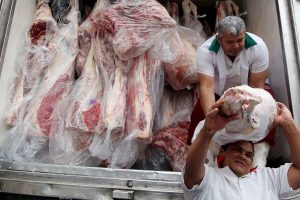Meat importers support use of seized frozen meat, seafood for calamities
THE Meat Importers and Traders Association (MITA) said seized frozen meat and seafood need to go into a reserve stockpile for use in emergencies, if the shipments are proven safe for human consumption. “Since meat and seafood that are properly frozen and stored do not pose any health concerns, such products can constitute a reserve […]

THE Meat Importers and Traders Association (MITA) said seized frozen meat and seafood need to go into a reserve stockpile for use in emergencies, if the shipments are proven safe for human consumption.
“Since meat and seafood that are properly frozen and stored do not pose any health concerns, such products can constitute a reserve stock of protein to be tapped and utilized in emergency situations,” MITA President Emeritus Jesus C. Cham said in a joint statement with the Fisheries and Aquaculture Board.
Earlier, the Department of Agriculture (DA) urged the Bureau of Customs (BoC) to release 580 metric tons of seized frozen mackerel for use in relief operations for typhoon victims.
Agriculture Secretary Francisco P. Tiu Laurel, Jr. ordered the Bureau of Fisheries and Aquatic Resources to conduct tests on the seized frozen fish.
“The seized mackerel underwent laboratory testing and were found to be fit for human consumption. We urge the competent authority to declare and certify the same as wholesome,” Mr. Cham added.
He said that the DA should attempt to put to use all frozen meat and seafood seized by the BoC or abandoned by importers.
He added that both agencies should enter into a memorandum of understanding to formalize procedures.
“They should likewise be declared wholesome if tested and found to be fit for human consumption,” he said.
Mr. Cham added that such a move could boost the government’s food security efforts and decrease food waste.
He said that products should be tested and taken out of port within two months of seizure or abandonment.
“In this manner, port congestion can be avoided, and costs of electricity, storage and demurrage can be lessened,” he added.
Republic Act 12022 or the Anti-Agricultural Economic Sabotage Act, seeks to deter the smuggling or hoarding of farm products. The law classifies agricultural smuggling, hoarding, profiteering, and engaging in a cartel as economic sabotage. — Adrian H. Halili
















